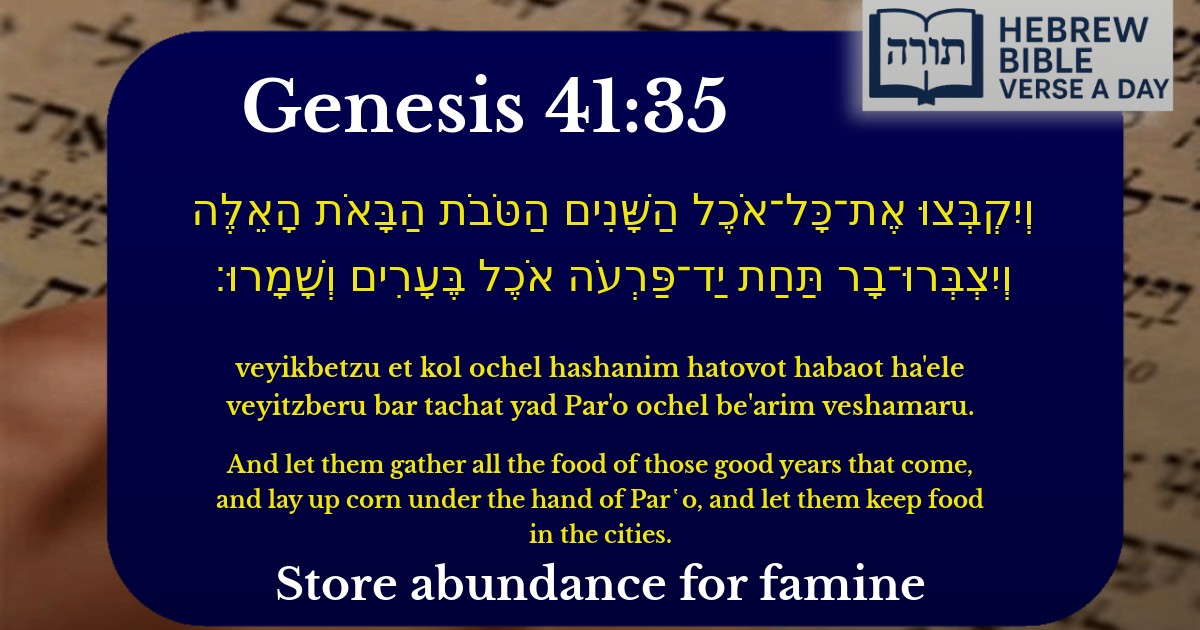Join Our Newsletter To Be Informed When New Videos Are Posted
Join the thousands of fellow Studends who rely on our videos to learn how to read the bible in Hebrew for free!
Hebrew Text
וְיִקְבְּצוּ אֶת־כָּל־אֹכֶל הַשָּׁנִים הַטֹּבֹת הַבָּאֹת הָאֵלֶּה וְיִצְבְּרוּ־בָר תַּחַת יַד־פַּרְעֹה אֹכֶל בֶּעָרִים וְשָׁמָרוּ׃
English Translation
And let them gather all the food of those good years that come, and lay up corn under the hand of Par῾o, and let them keep food in the cities.
Transliteration
Veyikbetzu et kol ochel hashanim hatovot habaot ha'ele veyitzberu bar tachat yad Par'o ochel be'arim veshamaru.
Hebrew Leining Text
וְיִקְבְּצ֗וּ אֶת־כׇּל־אֹ֙כֶל֙ הַשָּׁנִ֣ים הַטֹּב֔וֹת הַבָּאֹ֖ת הָאֵ֑לֶּה וְיִצְבְּרוּ־בָ֞ר תַּ֧חַת יַד־פַּרְעֹ֛ה אֹ֥כֶל בֶּעָרִ֖ים וְשָׁמָֽרוּ׃
וְיִקְבְּצ֗וּ אֶת־כׇּל־אֹ֙כֶל֙ הַשָּׁנִ֣ים הַטֹּב֔וֹת הַבָּאֹ֖ת הָאֵ֑לֶּה וְיִצְבְּרוּ־בָ֞ר תַּ֧חַת יַד־פַּרְעֹ֛ה אֹ֥כֶל בֶּעָרִ֖ים וְשָׁמָֽרוּ׃
🎵 Listen to leining
Parasha Commentary
📚 Talmud Citations
This verse is quoted in the Talmud.
📖 Ta'anit 9a
The verse is referenced in a discussion about the importance of storing food during years of plenty to prepare for years of famine, drawing a parallel to Joseph's actions in Egypt.
📖 Megillah 16b
The verse is mentioned in the context of discussing the wisdom and foresight of Joseph, emphasizing his role in ensuring food security for Egypt.


Context of the Verse
This verse (Bereshit 41:35) appears in the narrative of Yosef interpreting Pharaoh's dream about the upcoming seven years of plenty followed by seven years of famine. Yosef advises Pharaoh to appoint officers to gather and store surplus grain during the years of plenty to prepare for the years of famine.
Rashi's Commentary
Rashi explains that the phrase "וְיִצְבְּרוּ־בָר תַּחַת יַד־פַּרְעֹה" ("and lay up corn under the hand of Pharaoh") means the grain should be stored in royal granaries under Pharaoh's authority. This ensures centralized control, preventing individuals from hoarding grain for personal profit during the famine. Rashi also notes that storing food "בֶּעָרִים" ("in the cities") means distributing storage across multiple locations for easier access during the famine.
Rambam's Perspective
Rambam (Hilchot Matnot Aniyim 9:3) draws a halachic principle from this verse regarding communal responsibility. Just as Yosef advised storing grain for future need, communities must establish systems to support the needy. This reflects the Torah's emphasis on foresight and collective welfare.
Midrashic Insights
Halachic Implications
The verse underscores the importance of hishtadlut (human effort) in preparing for future challenges. The Talmud (Ta'anit 19b) derives that leaders must take practical steps to ensure food security, mirroring Yosef's advice to Pharaoh.